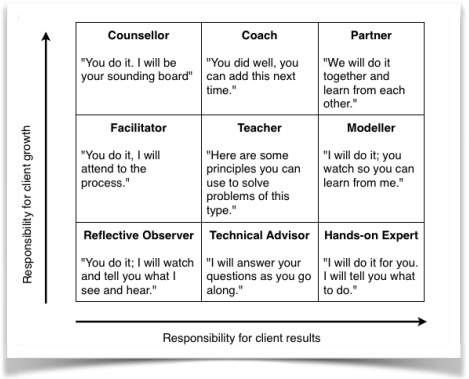Agile Coach: Big ‘C’ Coach or little ‘c’ coach

Agile Coach is such an overloaded term. It means different things to different people.
First, there’s different expectations by different people on what they need from an agile coach. Secondly, different agile coaches have different backgrounds and experiences. It is these experiences that shape who we are and what we bring to our coaching.
There is a lot of discussions on the web and books documenting what a coach does. In my words,
A coach is someone who helps people to learn faster and transform. An agile coach is someone who helps people to learn faster, transform AND has experience with agile.
Agile coach has experience with agile
Agile coaches should have lived experienced with agile. It is this experience that allows agile coaches to go beyond just giving the text book answer. Having that practitioner experience is invaluable so you can build credibility and trust with your client.
Whilst you may have experience with agile, not every approach you take will be from an agile perspective. Agile (or sometimes now referred to as Ways of Working) is just a means to an end, not the end in itself. The goal is never to be an ‘agile organisation’. Instead, agile is a strategic enabler.
As a coach I strive to have a positive and increasing impact with my clients. The impact is full stack (all levels) from an individual level, team level, organisation level and developing community level. I also just happen to apply my knowledge and experience with agile when appropriate to achieve results.
Agile coaching is about Individuals and Interactions
In the world of agile coaching, there is big ‘C’ Coach and little ‘c’ coach. Big ‘C’ Agile Coach is a Consultant (problem solver), while little ‘c’ coach is about the individuals and interactions – the individual (client) you are coaching and your interactions with the individual.
Little ‘c’ agile coach is about taking the time to know each person’s (client) motivation, how each person thinks, and understanding what each person really needs. It’s about getting to know individuals as people and is not so much about the role you play. Most of the time you are a trusted partner.
Responsibility for individual’s growth and results
The little ‘c’ agile coach is a partner that develops trusting relationships, fosters personal growth and helps individuals to reach their goals and achieve organisational results.
Based on the work from Esther Derby and Don Gray, Growing Agile has documented The 9 Coaching Roles.

9 Coaching Roles
We sometimes overcomplicate it with all these roles. My view that encapsulates it all is that an agile coach is a trusted partner, and you have responsibility for the client’s growth and results. In a post by Barry O’Rielly, he states “coaching is the mechanism to help you achieve the success you define for yourself, the coach is the ally that helps get you there”.
What may be useful is that you can use these 9 Coaching Roles to ask yourself:
- Which role do you see yourself in currently?
- Which role does the client see you in currently?
- Is there a mismatch of role expectations?
- Are you having the desired impact in your role?
You maybe thinking, isn’t coaching about teams too? Yes, of course it is. In today’s world, most work requires people in teams to work together to get things done. However, each team is also an ‘individual’ as no two teams are the same. Each team has its own individual qualities. This means coaching teams is about the individual team and their interactions because you don’t want to obscure what is special and distinct about each team.
High self-awareness
As an agile coach you need to be highly self-aware. Self-awareness is about knowing what biases you may have, what your behaviour (including our interactions with others) in response to how we feel and what we believe. Our words and actions impact those around us in ways we might not necessarily intend, or even be aware of.
Big ‘C’ Agile Coach occurs when the agile coach is the expert of agile however fails to develop the relationship with their client or meet them where they are now. The approach can seem rather directive like telling the client “you need to do it this way”, purporting to have all the answers or cookie cutter solutions. In this approach, the coach may lack self-awareness and may be driving an agenda that is often very different to what the client expects and needs. It is no wonder there are so many agile coaches (with bruised egos), failing to get traction with their clients all while throwing their hands up in the air saying “why won’t they listen.”
A coach needs to have humility. Humility, because coaching is about service to something bigger than you. It’s about servant leadership to the people, the teams and the organisation that you coach. Its never about what “I have achieved” and its never about your agenda. It’s about others achieving greatness.
“Coaches roll up their sleeves and get their hands dirty. They don’t just believe in our potential; they get in the arena to help us realize our potential. They hold up a mirror so we can see our blind spots and they hold us accountable for working through our sore spots. They take responsibility for making us better without taking credit for our accomplishments.” [1]
Value of a Coach
There is also as lack of understanding of what the value of a coach is. I’d like to clear up the common misconception that coaches don’t have ‘skin in the game’. Big misunderstanding. This is best illustrated by the story of Bill Campbell.
Not many may have heard of Bill Campbell, but he coached, among others, Larry Page, Sergey Brin, Eric Schmidt, Jonathan Rosenberg and Sundar Pichai at Google, Steve Jobs at Apple, Brad Smith at Intuit, Jeff Bezos at Amazon, John Donahoe at eBay, Marissa Mayer at Yahoo, Dick Costolo at Twitter, and Sheryl Sandberg at Facebook.
The book Trillion Dollar Coach asserts that Bill Campbell’s coaching and mentoring of some of the world’s most successful modern entrepreneurs has helped create over a trillion dollars in market value. So there it is, the coach has high responsibility for achieving organisational results and delivering value for customers.
There isn’t a one-size-fits-all agile coach. Find out what coach you need to fit your needs and to help you grow. I will finish here with Bill Gate’s opening line in his TED Talk – “Everyone needs a coach”.
Reference:
[1] Trillion Dollar Coach; by Eric Schmidt, Jonathan Rosenberg, and Alan Eagle; page xiv.
Photo by Austin Distel on Unsplash

 RSS - Posts
RSS - Posts
Thank you Chris. Concise yet an inspiring read, and a great reminder of some key points.
Great description that is really useful. Thanks for sharing your thoughts on this.